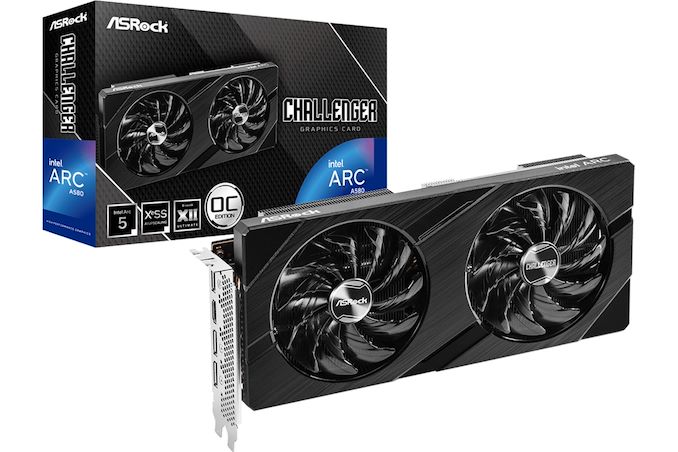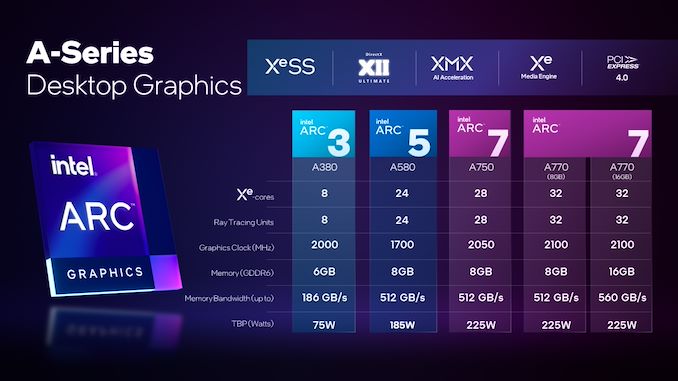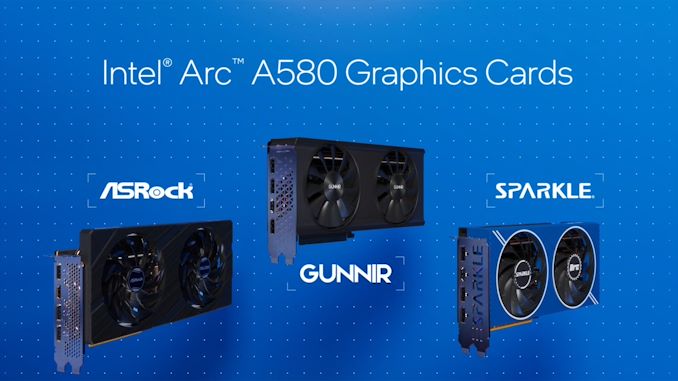Intel Launches Arc A580: A $179 Graphics Card for 1080p Gaming
by Anton Shilov on October 10, 2023 4:45 PM EST
When Intel unveiled its range of Arc A-series desktop graphics cards last year, it introduced four models: the Arc A770, Arc A750, Arc A580, and Arc A380. However, the Arc A580, which uses a cut-down ACM-G10 GPU, never reached the market for reasons that remain unclear. On Tuesday Intel finally fleshed out the Arc desktop lineup with a 500 series card, formally and immediately launching the Arc A580 graphics card.
Intel's Arc A580 is based on the Alchemist ACM-G10 graphics processor with 3072 stream processors and that is paired with 8 GB of memory using a 256-bit interface. While the the cut-down GPU has fewer SPs than its higher-performing counterparts, it retains all of the features that the Alchemist architecture has to offer, including world-class media playback capabilities, including hardware accelerated decoding and encoding in AV1, H.264, and H.265 formats.
The card sits under the Arc A770 and Arc A750 in terms of performance, but above the Arc A380, thus targeting gamers in budget. Intel itself positions its Arc A580 for 1080p gaming against AMD's Radeon RX 6600 and NVIDIA's GeForce RTX 3050 graphics cards that have been available on the market for about two-and-a-half years.
When compared to its rivals, the Arc A580 has higher compute performance (10.445 FP32 TFLOPS vs. Radeon RX 6600's 9 FP32 TFLOPS and GeForce RTX 3050's 8 FP32 TFLOPS) as well as dramatically higher memory bandwidth (512 GB/s vs. 224 GB/s). Though as FLOPS are not everything, we'll have to see how benchmarks play out. The biggest advantage for Intel right now is going to be memory bandwidth, as Intel is shipping a card with a far wider memory bus than anything else in this class – something that AMD and NVIDIA shied away from after multiple cryptocurrency rushes and crashes.
But Intel's Arc A580 is more power hungry than its rivals: as this part is based on Intel's top-tier ACM-G10 GPU, it has the power consumption to match, with a total graphics power rating of 185W. Conversely, AMD's Radeon RX 6600 and NVIDIA's GeForce RTX 3050 are rated for 132W and 130W, respectively.
Graphics cards based on the Intel Arc A580 GPU are set to be offered by ASRock, Gunnir, and Sparkle, starting at $179. At $179, the boards are cheaper than AMD's Radeon RX 6600 ($199) and Nvidia's GeForce RTX 3050 ($199), which makes it quite a competitive offering. Meanwhile, Intel's higher-performing Arc A750 can now be obtained for $189 - $199, which somewhat reduces appeal of the new board – though it remains to be seen if those A750 prices will last.
Source: Intel












8 Comments
View All Comments
meacupla - Tuesday, October 10, 2023 - link
From other reviews, the raw performance is: RX7600>RX6600>A580>RTX3050I haven't seen any numbers with FSR/XeSS/DLSS turned on, but I suspect DLSS 3050 would have best generated frame performance.
A580 has some serious issues with power efficiency, considering it's supposed to be a mid range card. It's as bad as AMD is with idle power on their chiplet GPUs. Reply
thestryker - Tuesday, October 10, 2023 - link
Intel definitely has Arc positioned in the right pricing bracket now across the board. The power consumption and requirement of rebar are the biggest shots against it. I really hope the next generation is able to shore up things as it's a very good thing to have the market actually being served. ReplySydneyBlue120d - Wednesday, October 11, 2023 - link
I'd like to see an updated comparison on Anandtech of the Intel with newest drivers cards VS Nvida and AMD cards :) ReplyPeachNCream - Wednesday, October 11, 2023 - link
AT hasn't done much in the way of dedicated GPU reviews. One can hope, but I believe that ship has sailed. ReplyTheinsanegamerN - Thursday, October 12, 2023 - link
The ship has sailed, burnt, sunk, and become one with the sand by now. The writing has been on the wall for anandtech for awhile now. ReplySamus - Wednesday, October 11, 2023 - link
The other advantage Intel has is the offlabel use cases. Yes they target gamers, but these are encoding powerhouses and you effectively get QuickSync in a add-in card, a boon to DVR\NVR users everywhere installing IPCAM's. BlueIris, etc support Deepstack and Sense.AI, both accelerated with Alchemy GPU's, and far more efficient than any CPU can encode and analyze multiple H265 streams. Replyphoenix_rizzen - Wednesday, October 11, 2023 - link
That's the comparison I want to see: how do these cards compare for video encoding, decoding, transcoding? Whether for IP cameras, media servers, or video editing.Which is the "sweet spot" GPU for this, for sticking into a server that will never be used for gaming? Reply
Tilmitt - Thursday, October 12, 2023 - link
Will you ever do another GPU review again? Is it that hard? Reply